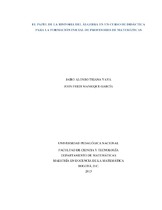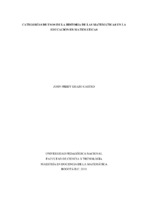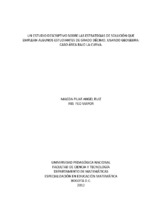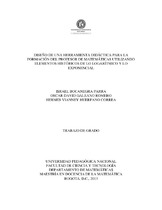Mostrar el registro sencillo del ítem
El papel de la historia del álgebra en un curso de didáctica para la formación inicial de profesores de matemáticas.
| dc.contributor.advisor | Mora Mendieta, Lyda Constanza | spa |
| dc.contributor.author | Manrique García, John Fredi | spa |
| dc.contributor.author | Triana Yaya, Jairo Alonso | spa |
| dc.date.accessioned | 2013-08-02T00:17:41Z | |
| dc.date.accessioned | 2017-12-12T21:22:57Z | |
| dc.date.available | 2013-08-02T00:17:41Z | |
| dc.date.available | 2017-12-12T21:22:57Z | |
| dc.date.issued | 2013 | |
| dc.identifier.other | TO-15682 | |
| dc.identifier.uri | http://hdl.handle.net/20.500.12209/189 | |
| dc.description.abstract | En el trabajo de grado se propone caracterizar el papel y el uso que se hace de la historia del Álgebra en el espacio académico enseñanza y aprendizaje de la Aritmética y el Álgebra (EAAA), para la formación inicial de profesores de Matemáticas (FIPM). | spa |
| dc.format | spa | |
| dc.format.mimetype | application/pdf | spa |
| dc.language.iso | spa | |
| dc.publisher | Universidad Pedagógica Nacional | spa |
| dc.rights.uri | https://creativecommons.org/licenses/by-nc-nd/4.0/ | |
| dc.subject | Álgebra - Historia | spa |
| dc.subject | Historia de las matemáticas | spa |
| dc.subject | Formación profesional de maestros | spa |
| dc.subject | Historia del álgebra | spa |
| dc.subject | Álgebra - Enseñanza - Aprendizaje | spa |
| dc.subject | Conocimiento profesional de profesores de matemáticas | spa |
| dc.subject | Aritmética - Enseñanza - Aprendizaje | spa |
| dc.subject | Relación historia de las matemáticas | spa |
| dc.subject | Profesores de matemáticas | spa |
| dc.title | El papel de la historia del álgebra en un curso de didáctica para la formación inicial de profesores de matemáticas. | spa |
| dc.publisher.program | Maestría en Docencia de la Matemática | spa |
| dc.rights.access | Acceso abierto | spa |
| dc.type.hasVersion | info:eu-repo/semantics/acceptedVersion | |
| dc.rights.accessrights | info:eu-repo/semantics/openAccess | |
| dc.rights.accessrights | http://purl.org/coar/access_right/c_abf2 | |
| dc.relation.references | Acevedo de Manrique, M., & Falk de Lozada, M. (2000). Formación del Pensamiento Algebraico de los Docentes. Revista Latinoamericana de Investigación en Matemática Educativa, 3(003), 245-264. | |
| dc.relation.references | Anacona, M. (2003). La Historia de las Matemáticas en la Educación Matemática. Revista EMA, Investigación e innovación en educación matemática., 8(1), 30-46. | |
| dc.relation.references | Arcavi, A. (1991). The experience of history in mathematics education: Two benefits of using history. For the Learning of Mathematics. An International Journal of Mathematics Education, 11(2), 11. | |
| dc.relation.references | Arcavi, A., & Bruckheimer, M. (2000). Mathematics and its History: An Educational Partnership. In V. Katz (Ed). In Using History to Teach Mathematics: An International Perspective (pp. 135-146). Washington: Mathematical Association of America. | |
| dc.relation.references | Arcavi, A., & Isoda, M. (2007). Learnin to listen: from historical sourcesto classroom practice. Springer Science, 111-129. | |
| dc.relation.references | Bkouche, R. (2000). sur la notion de perspective historique dans l´enseignement d´une science. Represe . | |
| dc.relation.references | Blanco Álvarez, H. (2012). Estudio de las Actitudes Hacia una Postura Sociocultural y Política de la Educación Matemática en Maestros en Formación Inicial. REDIMAT. Journal of Research in Mathematics Education, 1(1), 57-78. | |
| dc.relation.references | Boyé, A. (2003). ¿Francois Viète inventor del álgebra? Actas Seminario Orotavade Historia de la Ciencia, 259-376. (S. Toledo, Trad.) Fundación Canaria. | |
| dc.relation.references | Cardeñoso , J., Flores , P., & Azcárate , P. (s.f.). El desarrollo profesional de los profesores de matemáticas como campo de investigación en educación matemática. En P. Gómez, & L. Rico , Iniciación a la investigación en didáctica de las matemáticas. Homenaje al profesor Mauricio Castro (pág. 12). Granada, España: Universidad de Granada | |
| dc.relation.references | Charbonneau, L. (1996). From Euclid to Descartes: Algebra and its relation to Goemetry. En bednarz, & Kieran, Approaches to algebra (págs. 12-37). Kluwer academic publishers. | |
| dc.relation.references | Chevallard, T. (1991). La transposición didáctica. Del saber sabio al saber enseñado. Buenos Aires: Ed. Aique, 1997. Nueva edición ampliada de la original de 1985. | |
| dc.relation.references | Davila, G. (Mayo de 2003). El Desarrollo del Álgebra Moderna. Parte III: El Surgimiento del Álgebra Abastracta. Apuntes de Historia de las Matemáticas, 2(2). | |
| dc.relation.references | Esquinas Sancho, A. M. (2008). Dificultades de Aprendizaje del Lenguaje Algebraico: Del símbolo a la formalización algebraica: Aplicación a la práctica docente. Tésis Doctoral. Madrid: Universidad Complutense de Madrid. | |
| dc.relation.references | Fauvel, J., & van Maamen, J. (Eds.). (2002). History in Mathematics Education. The ICMI Study. New York/Boston/Dordrecht/London/Moscow: Kluver Academic Publishers. | |
| dc.relation.references | Fauvel, J., & van Maanen, J. (1997). The role of the history of mathematics in the teaching and learning of mathematics: discussion document for an ICMI study (1997-2000). Mathematics in School, 26(3), 10-11. | |
| dc.relation.references | Fauvel, J., & Van Maanen, J. (2000). Historical support for particular subjects. En History in mathematics education: the ICMI Study (págs. 241-243). Kluwer: Dordrecht. | |
| dc.relation.references | Frege, G. (1972). Fundamentos de la Aritmética. Barcelona: Editorial Laia. | |
| dc.relation.references | Furinghetti, F. (2007). Teacher education through the history of mathematics. Educational Studies in Mathematics, 66(2), 131-143. | |
| dc.relation.references | Furinghetti, F., & Pehkonen, E. (2002). Rethinking characterizations of beliefs. En G. Leader, E. Pehkonen, & G. Torner (Edits.), Beliefs: A hidden Variable in Mathematics Education (págs. 39-57). suiza : Kluwer Academic Publishers | |
| dc.relation.references | Gallardo, A., & Torres, O. (2005). El Álgebra aritmética de George Peacock: un puente entre la Aritmética y el Álgebra Simbólica. CINVESTAV. | |
| dc.relation.references | Grattan-Guinness, I. (2004a). History or Heritage? An Important Distinction in Mathematics and for Mathematics Education. American Mathematical Monthly, 111(1), 1-12. | |
| dc.relation.references | Grattan-Guinness, I. (2004b). The mathematics of the past: Distinguishing its history from our heritage. Historia Matemática, 31(2), 163–185. | |
| dc.relation.references | Grossman, P. L. (1990). The Making of a Teacher. Teacher Knowledge and Teacher Education.New York: Columbia University. | |
| dc.relation.references | Guacaneme, E. (2008). Una aproximación a la relación Historia de las Matematicasconocimiento del profesor de Matemáticas. Tercer enceuntro de programas de formación de profesores de matemáticas. Bogotá. | |
| dc.relation.references | Guacaneme, E. (2010). ¿Qué tipo de Historia de las Matemáticas debe ser apropiada por un profesor? Revista EDUCyT, 2. | |
| dc.relation.references | Guacaneme, E. (2011). La historia de las Matemáticas en la educación de un profesor: Razones e intenciones. XIII Conferencia Interamericana de Educación Matemática – CIAEM. Recife (Brasil), 26 al 30 de junio. | |
| dc.relation.references | Gutiérrez, R. (2012). Embracing Nepantla: Rethinking "Knowledge" and its Use in Mathematics. REDIMAT. Journal of Research in Mathematics Education, 1(1), 29- 56. | |
| dc.relation.references | Jankvist, U. T. (2009). On empirical research in the field of using history in mathematics education. Revista Latinoamericana de Investigación en Matemática Educativa., 12(1), 67‐101. | |
| dc.relation.references | Jaworski, B., & Wood, T. (2008). The mathematics teacher educator as a developing professional. En The international handbook of mathematics (Vol. 4). Rotterdam, The Netherlands: Sense Publishers. | |
| dc.relation.references | Jaworsky, B. (2008). Mathematics Teacher Educator Learning and Development. En B. Jaworsky, & T. Wood, The Mathematics Teacher Educator as a Developing Professional (págs. 1-13). Sense Publishers. | |
| dc.relation.references | Kleiner, I. (2007). A History of Abstract Álgebra. Boston: Birkhäuser. | |
| dc.relation.references | Llinares , S., & Krainer , K. (2006). Mathematics (student) teachers and taechers educator as learners. En A. Gutierrez, & P. Boero , Handbook of research on the psychology of mathematics education: past, present and future (págs. 429-459). Sense Publishers. | |
| dc.relation.references | Mora, L. (2011). Programa de Enseñanza y Aprendizaje de la Aritmética y el Álgebra. Bogotá: Universidad Pedagógica Nacional. | |
| dc.relation.references | Ochoviet, C. (2007). De la Resolución de Ecuaciones Polinómicas al Álgebra Abstracta: un Paseo Através de la Historia. Revista digital Matemática, Educación e Internet, 8(1), 1-19. | |
| dc.relation.references | Oostra, A. (2003). Acerca del Artículo On the Logic of Number, de Charles S. Peirce. Boletín de Matemáticas, X(1), 13-20. | |
| dc.relation.references | Otte , M. (1979). The education and professional life of mathematics teachers. Unesco (págs. 107-133). Paris : Unesco . | |
| dc.relation.references | Panagiotou, E. N. (2010). Using History to Teach Mathematics: The Case of Logarithms. Science & Education, 20(1), 1-35. | |
| dc.relation.references | Pérez, J. H. (2002). La Aritmética según Gottlob Frege. Un ejemplo de matemáticas elementales. En Memorias del XIII Encuentro de geometría y sus aplicaciones y I Encuentro de aritmética. Bogotá D.C.: Universidad Pedagógica Nacional. | |
| dc.relation.references | Radford, L., M, B., Bekken, O., Boero, P., Dorier, J., Katz, V., y otros. (2000). Historical formation and student understandig of mathematics. En History in mathematics education. The ICMI study (págs. 143-170). | |
| dc.relation.references | Rico , L. (2004). Reflexiones sobre la formación inicial del profesor de matemáticas de secundaria. Profesorado, revista de curriculum y formación del profesorado, 8(1). | |
| dc.relation.references | Rico , L. (2004). Reflexiones sobre la formación inicial del profesor de matemáticas de secundaria. Profesorado, revista de currículum y formación del profesorado,, 8(1). | |
| dc.relation.references | Sánchez, M. (2011). A review of research trends in mathematics teacher education . PNA, 129-145. | |
| dc.relation.references | Schubring, G., Cousquer, É., Fung, C., El Idrissi, A., Gispert, H., Torkil, H., y otros. (2000). History of mathematics for trainee teachers. In J. Fauvel & J. van Maanen (Eds.). En History in mathematics education.The ICMI Study (págs. 91-142). Dordrecht: Kluwer Academic Publishers. | |
| dc.relation.references | Sessa, C. (2005). Iniciación al estudio didáctico del Álgebra. Orígenes y perspectivas. Buenos Aires, Argentina: Libros del Zorzal. | |
| dc.relation.references | Shulman, L. S. (1986a). Paradigms and research programs in the study of teaching. En M. W. (Ed.), Handbook of research on teaching. New York: MacMillan. | |
| dc.relation.references | Shulman, L. S. (1986b). Those who understand: knowledge growth in teaching. Educational Researcher, 15(2), 4-14. | |
| dc.relation.references | Shulman, L. S. (1987). Knowledge and Teaching. Foundations of the New Reform. Harvard Educational Review, 57(1), 1-22. | |
| dc.relation.references | Shulman, L. S. (2001). Conocimiento y enseñanza. Estudios Públicos, 83, 163-196 | |
| dc.relation.references | Shulman, S. L. (2005). Conocimiento y Enseñanza: Fundamentos de la nueva reforma. PROFESORADO. Revista de curriculum y formación de profesorado, 9(002), 1 - 30. | |
| dc.relation.references | Socas, M. M., Camacho, M., Palarea, M., & Hernández., J. (1989). Iniciación al Álgebra. Madrid, España: Editorial Síntesis. | |
| dc.relation.references | Stacey , K. (2008). Mathematics for secondary teaching. En P. Sullivan, & T. Wood (Edits.), The international handbook of mathematics teacher education (Vol. 1, págs. 87-113). Sense Publishers . | |
| dc.relation.references | Sullivan , P. (2008). Knowledge for teaching mathematics. An introduction. En P. Sullivan , & T. Wood, Knowledge and beliefs in mathematics Teaching and Teaching development (págs. 1-9). Sense Publishers. | |
| dc.relation.references | Torres, L. A. (2011). Fenomenología histórica del concepto de ecuación y potencialidades de su uso en la escuela. CIAEM. XIII CONFERENCIA INTERAMERICANA DE EDUCACIÓN MATEMÁTICA. | |
| dc.relation.references | Tzanakis, C., Arcavi, A., de Sá, C., Isoda, M., Niss, M., & al, e. (2000). Integrating history of mathematics in the classroom: an analytic survey. In J. Fauvel, & J. van Maamen (Eds.), History in mathematics education. The ICMI Study (pp. 201-240). Dordrecht: Kluwer Academic Publishers. | |
| dc.relation.references | Winicki, G. (2000). The Analysis of Regula Falsi as an Instance for Professional Development of Elementary School Teachers. In V. Katz (Ed.), Using History to Teach Mathematics: An International Perspective (pp. 129-133). Washington: The Mathematical Association of America. | |
| dc.publisher.faculty | Facultad de Ciencia y Tecnología | spa |
| dc.type.local | Tesis/Trabajo de grado - Monografía - Maestría | spa |
| dc.type.coar | http://purl.org/coar/resource_type/c_bdcc | eng |
| dc.description.degreename | Magister en Docencia de la Matemática | spa |
| dc.description.degreelevel | Maestría | spa |
| dc.type.driver | info:eu-repo/semantics/masterThesis | eng |
| dc.identifier.instname | instname:Universidad Pedagógica Nacional | spa |
| dc.identifier.reponame | reponame: Repositorio Institucional UPN | spa |
| dc.identifier.repourl | repourl: http://repositorio.pedagogica.edu.co/ | |
| dc.subject.lemb | Conocimiento - Docente - Matemáticas | spa |
| dc.subject.lemb | Formación docente - Matemáticas | spa |
| dc.subject.lemb | Historia - Algebra | spa |
| dc.subject.lemb | Historia - Matemáticas | spa |
| dc.type.version | info:eu-repo/semantics/acceptedVersion | |
| dc.type.version | http://purl.org/coar/version/c_ab4af688f83e57aa | |
| dc.rights.creativecommons | Attribution-NonCommercial-NoDerivatives 4.0 International |




